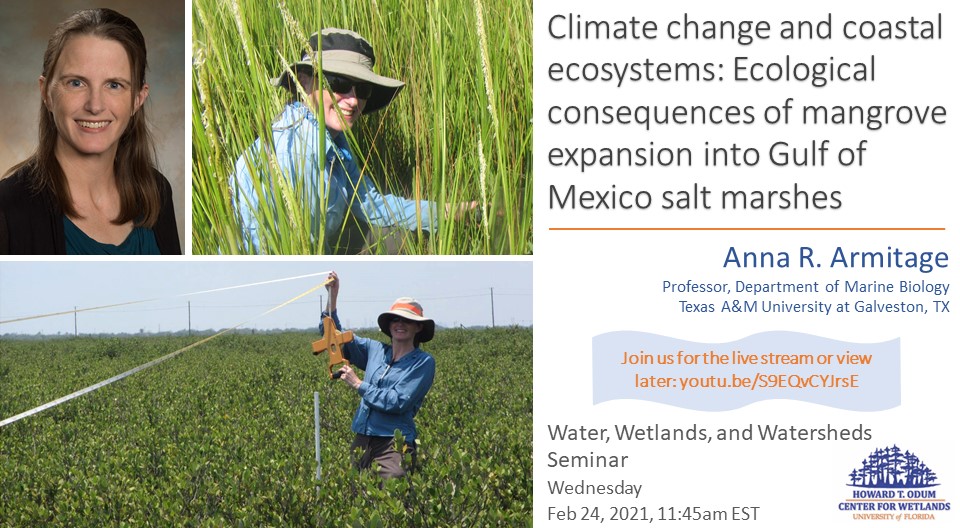February 24, 2021
Climate change and coastal ecosystems: Ecological consequences of mangrove expansion into Gulf of Mexico salt marshes
Anna Armitage, Professor, Department of Marine Biology, Texas A&M University at Galveston, TX
Join us for the live stream Feb 24, 11:45am EST: youtu.be/S9EQvCYJrsE
Abstract
Climate change is driving landscape-scale shifts in plant species distributions and abundances, subsequently altering ecosystem structure and function. Such shifts are occurring along the Texas Gulf Coast (USA), where increases in temperature minima have led to mangrove encroachment into salt marsh wetlands. Partly in response to this regime shift, coastal managers in this region have increased the use of black mangroves (Avicennia germinans) in restoration projects. However, it is unknown if this adaptive approach will yield appropriate ecological outcomes. Here, I synthesize results from a series of surveys and field experiments that quantified some ecological consequences of mangrove restoration or establishment in novel areas. Generally, marsh plant cover and diversity were inversely related to mangrove cover. Benthic epifauna, nekton, and shorebird assemblages were distinctly different between marsh and mangrove stands. Mesocosm studies revealed that diets of mangrove leaves reduced basal consumer fitness. In addition, mangrove aerial root structures decreased predation success on shrimp and snails. Mangroves increased aboveground carbon but did not substantially increase overall carbon retention in the soil. Mangroves reduced coastal erosion rates. Overall, this synthetic body of work demonstrated that salt marshes and mangroves support different plant and animal assemblages, and that planting mangroves in novel areas is likely to cause complex changes in ecosystem processes.
Bio
Dr. Anna Armitage is a community ecologist with research interests in food webs and ecological restoration in coastal habitats. Her current research seeks to identify ecologically successful restoration techniques in coastal wetlands. She is also studying the causes and ecological consequences of the expansion of native black mangrove populations into northern Gulf of Mexico salt marshes in the face of near-term climate change and sea level rise. Dr. Armitage completed her Ph.D. in Biology at the University of California Los Angeles, and is currently a Professor of Marine Biology at Texas A&M University at Galveston.
Seminar postcard

